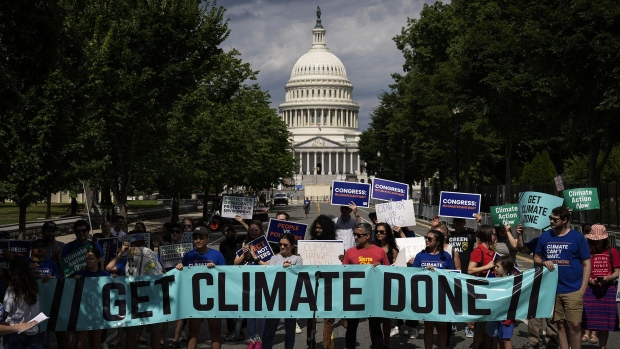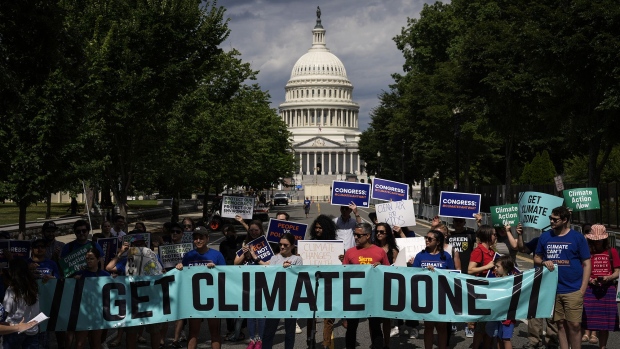
Leslie Kaufman, Bloomberg News
WASHINGTON
EnergiesNet.com 08 19 2022
Aug 16, 2022
Climate Bill Compromises Leave a Sour Taste With Activists
Leslie Kaufman, Bloomberg News

Environmental activists rally near the U.S. Capitol in July. , Photographer: Drew Angerer/Getty Images North America
(Bloomberg) —
The sweeping Inflation Reduction Act just passed by Congress will not only slash planet-warming greenhouse gas emissions, Democrats say, it will steer record funding to programs supporting environmental justice — that is, addressing the legacy of disproportionate environmental harm in low-income and minority communities and ensuring they are treated fairly in the future.
By Democrats’ accounting, there is $60 billion in the $374 billion IRA that will go toward steps like cleaning up air pollution at ports and cutting emissions from heavy vehicles such as school buses and garbage trucks, which stand to benefit such communities.
Yet many activists with environmental justice groups are disappointed. Among other reasons why, they worry the bill — which President Joe Biden is expected to sign into law today — doesn’t have enough money for climate adaptation and at the same time allows for new fossil fuel pollution, which will continue to have an outsize impact on the vulnerable. And they’re unhappy about the bill’s incentives for carbon capture and storage, which they see as posing new risks.
“Environmental justice communities once again are placed in a precarious position of having to accept risky CCS [carbon capture and storage] technologies, more pollution, and unfair health ‘trade-offs’ in order to get economic, environmental and climate benefits,” Robert Bullard said in a statement. Bullard is the founding director of the Bullard Center for Environment & Climate Justice at Texas Southern University and is widely considered the father of the environmental justice movement.
The roots of today’s discontent can be traced, in part, back to the 2020 presidential campaign. Then-candidate Biden ran on a $2.2 trillion climate plan and pledged to spend 40% of that money on disadvantaged communities. The promise reflected the rise of environmental justice as a political issue on the left, pushed by advocacy groups including Evergreen Action, the Hip Hop Caucus and the Sunrise Movement.
Soon after taking office, Biden signed an executive order mandating that 40% of the benefits of select federal climate and energy programs flow to disadvantaged communities. The administration released the Climate and Economic Justice Screening Tool this past February that would define how “disadvantaged” or “vulnerable” could be measured in concrete terms, but the tool doesn’t explicitly account for race or ethnicity.
Although the president’s infrastructure bill passed, it was in a whittled-down form, and his big economic and climate bill was on life support for another nine months. Margaret Walls, a senior fellow with Resources for the Future, a climate and energy think tank, noted in an analysis of the legislation that environmental justice concerns haven’t always been a priority in climate policy because they’re not really an ideal fit with climate concerns.
“We are linking these two things in our policy environment at the moment, and they aren’t that well linked. The environmental justice concerns, which have been around for decades, are often not linked to greenhouse gas emissions,” she said.
Walls estimates the IRA has closer to $53 billion for environmental justice, while the Congressional Progressive Caucus Center, a nonprofit, pegs it at a lower $49 billion. Still, Walls calls the bill’s passage an “important first step” in rectifying past wrongs. Some significant provisions by her accounting include:
- $27 billion for the establishment of a Greenhouse Gas Reduction Fund to provide low-cost financing for clean energy infrastructure projects around the country, 40% reserved for disadvantaged communities
- $1.9 billion for projects to improve transit access and walkability, along with investments to address stormwater problems, urban-heat-island hot spots, flood-prone roads and other infrastructure in disadvantaged communities
- $250 million for Tribal and Native Hawaiian adaptation and resilience
- $550 million for US Bureau of Reclamation projects to provide domestic water supplies to communities or households lacking reliable access to water
- $1.5 billion for the US Forest Service’s Urban and Community Forestry Program for tree planting and other activities that benefit underserved communities
- $2.25 billion for addressing air pollution at ports
- $3 billion for a new environmental and climate justice block grant program for community-led monitoring, prevention and remediation of pollution.
Julian Brave NoiseCat, a climate and Indigenous advocate, said the money for helping communities adapt to climate impacts will come up short. “The unfortunate truth is that if you just look at the cost of adapting and relocation of some of the villages in western Alaska, the level of investment you’re getting from this bill is not adequate,” said NoiseCat, who was involved in the drafting of the Green New Deal.
Bullard noted that much of the block grant money will be run through states. For residents of Republican-led states, that may be a problem. “I’m in the red state of Texas,” he told Bloomberg Green, “where the blue cities are going to have to fight for every dime.”
Then there’s the bill’s requirement that the US government auction oil and gas leases on federal land and in the Gulf of Mexico, a provision added to win Senator Joe Manchin’s key vote so the bill could clear the Senate. Jean Flemma, co-founder of the think tank Urban Ocean Lab, says low-income communities may suffer as a result. “The threat to communities in the Gulf of Mexico from potentially years and years more fossil fuel production and petrochemical production is real,” she said.
Beyond the climate measures in the bill, environmental justice advocates and members in Congress have said that the bill’s healthcare provisions will help communities whose health has long suffered from exposure to pollution.“Together, lowering the cost of prescription drugs and health care premiums are vital strides in our fight for economic justice, and this is particularly important to low-income communities, underserved communities and communities of color,” said House Speaker Nancy Pelosi on Friday in a speech before Congress ahead of voting through the bill.
But environmental justice groups are wary of a deal Manchin has said he secured from Democratic leadership to advance separate legislation next month, to complete a natural gas pipeline in his home state of West Virginia and reform permitting for energy infrastructure. Permitting reform could potentially speed the construction of new transmission lines for clean energy, but also fossil fuel pipelines. The rationale is to prevent infrastructure projects from getting bogged down in lengthy and expensive delays. However, many in disenfranchised communities see environmental reviews as a key tool in their fight to prevent more dumping in their neighborhoods.
Activists are now gearing up for that battle. And they plan to keep pushing Biden and lawmakers to create a Civilian Climate Corps, a version of the New Deal-era Civilian Conservation Corps retooled for the climate age.
Mustafa Santiago Ali, the executive vice president of the National Wildlife Federation and formerly a senior advisor for environmental justice at the Obama-era Environmental Protection Agency, said the push to get environmental justice priorities into future legislation will continue.
“We love our country,” Ali said, “but we also understand that when there are policies moving forward that have gaps in them that could bring additional harm — we have a right to speak out, to criticize, to highlight.”
bloomberg.com 08 16 2022












